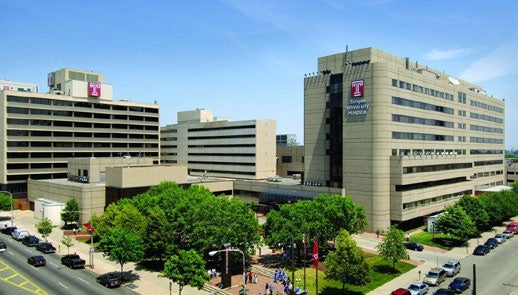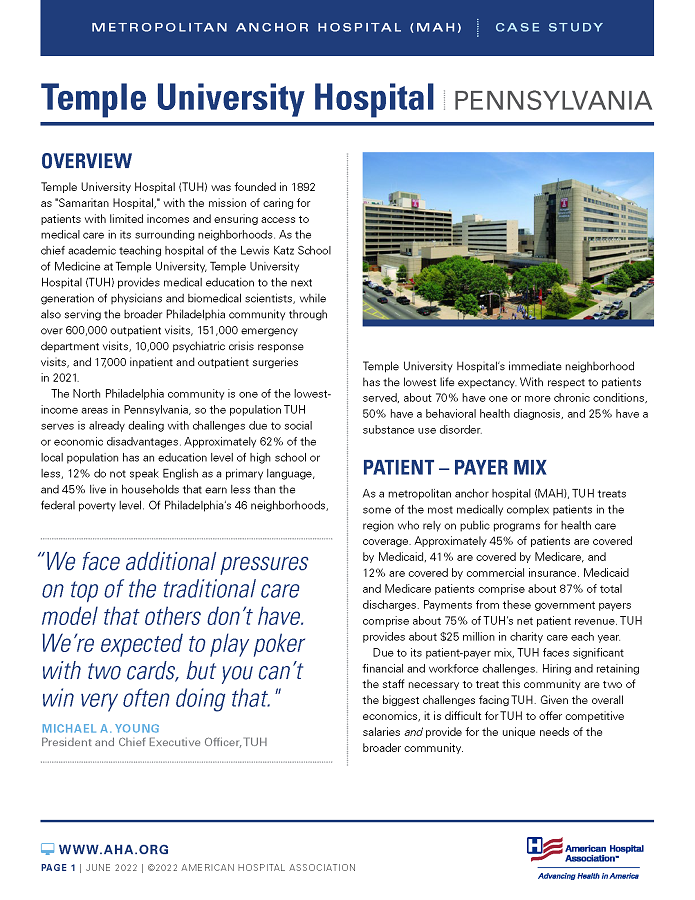

Temple University Hospital | Pennsylvania
Metropolitan Anchor Hospital (MAH) | Case Study
Overview
 Temple University Hospital (TUH) was founded in 1892 as "Samaritan Hospital," with the mission of caring for patients with limited incomes and ensuring access to medical care in its surrounding neighborhoods. As the chief academic teaching hospital of the Lewis Katz School of Medicine at Temple University, Temple University Hospital (TUH) provides medical education to the next generation of physicians and biomedical scientists, while also serving the broader Philadelphia community through over 600,000 outpatient visits, 151,000 emergency department visits, 10,000 psychiatric crisis response visits, and 17,000 inpatient and outpatient surgeries in 2021.
Temple University Hospital (TUH) was founded in 1892 as "Samaritan Hospital," with the mission of caring for patients with limited incomes and ensuring access to medical care in its surrounding neighborhoods. As the chief academic teaching hospital of the Lewis Katz School of Medicine at Temple University, Temple University Hospital (TUH) provides medical education to the next generation of physicians and biomedical scientists, while also serving the broader Philadelphia community through over 600,000 outpatient visits, 151,000 emergency department visits, 10,000 psychiatric crisis response visits, and 17,000 inpatient and outpatient surgeries in 2021.
The North Philadelphia community is one of the lowest-income areas in Pennsylvania, so the population TUH serves is already dealing with challenges due to social or economic disadvantages. Approximately 62% of the local population has an education level of high school or less, 12% do not speak English as a primary language, and 45% live in households that earn less than the federal poverty level. Of Philadelphia’s 46 neighborhoods, Temple University Hospital’s immediate neighborhood has the lowest life expectancy. With respect to patients served, about 70% have one or more chronic conditions, 50% have a behavioral health diagnosis, and 25% have a substance use disorder.
“We face additional pressures on top of the traditional care model that others don’t have. We’re expected to play poker with two cards, but you can’t win very often doing that."
Michael A. Young
President and Chief Executive Officer, TUH
Patient–Payer Mix
As a metropolitan anchor hospital (MAH), TUH treats some of the most medically complex patients in the region who rely on public programs for health care coverage. Approximately 45% of patients are covered by Medicaid, 41% are covered by Medicare, and 12% are covered by commercial insurance. Medicaid and Medicare patients comprise about 87% of total discharges. Payments from these government payers comprise about 75% of TUH’s net patient revenue. TUH provides about $25 million in charity care each year.
Due to its patient-payer mix, TUH faces significant financial and workforce challenges. Hiring and retaining the staff necessary to treat this community are two of the biggest challenges facing TUH. Given the overall economics, it is difficult for TUH to offer competitive salaries and provide for the unique needs of the broader community.
TUH's Unique Approach to Care
Each year, TUH spends $1.6 billion to further its health care mission. With 50% of its employees living in the community, TUH is a vital part of the local economy. TUH’s contributions include:
COVID-19 Community Outreach
TUH administered more than 128,000 COVID-19 vaccine doses, and two-thirds of those recipients were Black or Hispanic. The hospital established a monoclonal antibody infusion clinic and post-COVID-19 recovery clinic. Although TUH’s population is at high risk for COVID-19, its COVID-19 patient mortality rate was 33% better than hospitals across the nation. It was the only Pennsylvania hospital honored by Healthgrades as a Leading Hospital in COVID Care for excellence in treating high volumes of coronavirus patients during the pandemic’s first wave.
Supporting Moms and Newborns
TUH’s pre- and post-natal care programs include perinatal care, breastfeeding support, and Sleep Awareness Family Education. TUH offers trauma-informed care for mothers with substance use disorder (SUD), including behavioral health services and medication-assisted treatment. To strengthen equity in care delivery, TUH is planning a dedicated hospital for women and infants. Medicaid covers 90% of infant deliveries.
Workforce Development
With more than 10,000 faculty members and employees, Temple University Health System is a major regional employer. More than 2,500 students of medicine, nursing, and other health professions received hands-on training at TUH last year. Trainees are enrolled not only in Temple’s affiliated School of Medicine, College of Public Health, and School of Pharmacy, but in numerous other colleges and community-based training programs.
Housing Smart
In collaboration with managed care plans and social service agencies, TUH launched a two-year program to help 25 homeless Medicaid patients who frequently use hospital emergency departments. Patients are provided free housing and caseworkers to connect them with healthcare, nutritious meals, and social services.
Other Community and Social Support Programs
Like many other metropolitan anchor hospitals, TUH offers food, housing, behavioral health, trauma, and SUD support programs. A multi-visit patient clinic has been established to specifically treat patients with a high frequency of emergency department use. This holistic treatment of high-use patients not only lowers treatment costs but also leads to better health outcomes.
Metropolitan Anchor Hospitals Need Support
Despite its financial challenges, TUH continues to support innovative programs to improve the health and well-being of its community. However, with higher care costs and less reimbursement, staff retention remains a challenge. With additional and more stable financial resources, MAHs like TUH could expand their successful programs, strengthen patient outcomes, and further improve overall health.


